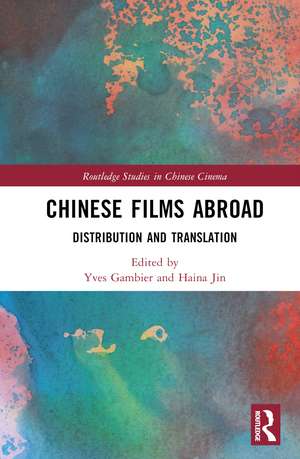Chinese Films Abroad: Distribution and Translation: Routledge Studies in Chinese Cinema
Editat de Yves Gambier, Haina Jinen Limba Engleză Hardback – 2 apr 2024
The periodisation of Chinese cinema(s) does not necessarily match the political periods: on the one hand, the technical development of the film industry and the organisation of translation in China, and on the other hand, official relations with China and translation policies abroad impose different constraints on the circulation of Chinese films. This volume deals with the distribution and translation of films from mainland China, Taiwan, Hong Kong, and the Chinese diaspora. To this end, the contributors address various issues related to the circulation and distribution of Chinese films, including co- productions, agents of exchange, and modes of translation. The approach is a mixture of socio- cultural and translational methods. The data collected provides, for the first time, a quantitative overview of the circulation of Chinese films in a dozen foreign countries.
The book will greatly interest scholars and students of Chinese cinema, translation studies, and China studies.
Preț: 767.80 lei
Preț vechi: 1156.70 lei
-34% Nou
Puncte Express: 1152
Preț estimativ în valută:
146.91€ • 153.83$ • 121.86£
146.91€ • 153.83$ • 121.86£
Carte tipărită la comandă
Livrare economică 10-24 aprilie
Preluare comenzi: 021 569.72.76
Specificații
ISBN-13: 9781032739410
ISBN-10: 103273941X
Pagini: 268
Ilustrații: 18
Dimensiuni: 156 x 234 mm
Greutate: 0.65 kg
Ediția:1
Editura: Taylor & Francis
Colecția Routledge
Seria Routledge Studies in Chinese Cinema
Locul publicării:Oxford, United Kingdom
ISBN-10: 103273941X
Pagini: 268
Ilustrații: 18
Dimensiuni: 156 x 234 mm
Greutate: 0.65 kg
Ediția:1
Editura: Taylor & Francis
Colecția Routledge
Seria Routledge Studies in Chinese Cinema
Locul publicării:Oxford, United Kingdom
Public țintă
Academic, General, Postgraduate, Professional Practice & Development, Undergraduate Advanced, and Undergraduate CoreCuprins
1. Introduction 2. From Benshi to Subtitler: Translating Chinese-Language Cinema in/for Japan 3. Transnational by Means of Hyperlocal: Sinophone Cinema in Singkawang (West Kalimantan) 4. The Interlocking Cogs of Audiovisual Translation and the Socio-political Landscape: A Cultural Exchange between Korea and China 5. The Trans-narration of Chinese Kung Fu Films by Swahili language DJs, in Tanzania 6. Chinese Cinema in Spain 7. Chinese Cinema at the Invitation of French Cinema Literati: Chinese Film Events and Festivals in France 8. The Issue of “Chineseness” in the Italian Translation of Chinese Films between the Early 1990s and 2018 9. Patronage in Chinese Film Dissemination and Translation from 1971 – 1993: The German-Language Countries 10. A History of Firsts: The Translation and Distribution of Chinese-language Films in the United Kingdom 11. Film Audiences as Context for Translation: Three Sketches of Chinese Cinema in the United States 12. The Celluloid Road across the Pacific: Chinese Film Exhibitions in 1920s Honolulu 13. Brief Analysis of Chinese Films within the Film Industry in Argentina, Chile, Mexico, and Uruguay
Notă biografică
Yves Gambier is emeritus professor at the University of Turku (Finland) where he taught translation and interpreting (1973– 2014). His research has focused on audio-visual translation, specialised discourse and translation, and training translators. He has edited/ co- edited more than 30 books and several special issues of journals.
Haina Jin is a professor of translation, film, and communication studies at the Communication University of China. Her research interests include film translation, translation history, and film history. She is the series editor of Routledge Series in Chinese Cinema and edited the volume Chinese Cinemas in Translation and Dissemination (Routledge).
Haina Jin is a professor of translation, film, and communication studies at the Communication University of China. Her research interests include film translation, translation history, and film history. She is the series editor of Routledge Series in Chinese Cinema and edited the volume Chinese Cinemas in Translation and Dissemination (Routledge).
Descriere
This book examines Chinese films made and shown abroad roughly between the 1920s and the 2020s, from the beginning of the international exchange of the Chinese national film industry to the emergence of the concept of soft power.



